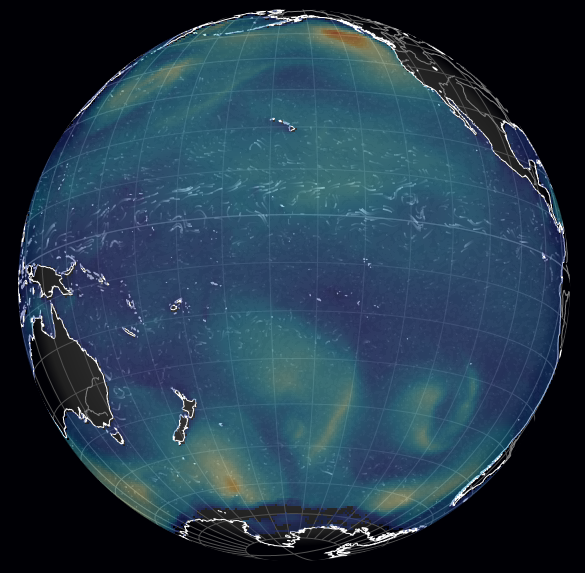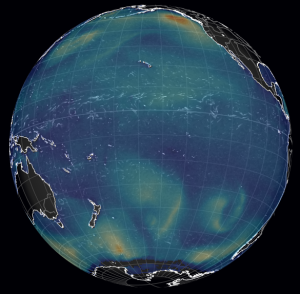Freedom is a very basic personal instinct. I think all creatures want to be free, free from fear and desire, free from hunger and pain. The protection of key personal freedoms has been central to the rise of civilisation, and this has continued in modern societies through activities like the abolition of slavery and the emancipation of women. We now believe that freedom is a basic human right and human happiness and social cohesion is dependent on it.
Img: earth wind Map
But we are even now not entirely free – and much of what we do in life is really an effort to procure more freedom than what is granted to us at birth by our society. So gaining power over others has become the primary means to exercise more personal freedom. This drive to acquire power is the basis for the market – as money grants us material freedom so earning money becomes in theory a freedom creating exercise. Freedom of mind is more elusive but either quenching or ridding ourselves of desires can be described as a method of freeing ourselves from them, and so becoming happy. By engaging in such activities, we express in our everyday lives the truth that greater freedom is a good thing, whether we think much about how we obtain it or not.
The struggle for personal freedom has been continuing since the first microbe ate another to make some space in the warm purple soupy ocean of the Archaean earth. Evolution is simply the playing out of these desires through time, with the reward for chance innovations being an enhanced domination of other species. Even though the struggle of evolution was undertaken nearly blindly by its competitors, it delivered us our bodies and the supporting natural world around us. The survival games of a market economy continue with this model. So long as a level playing field is maintained, market economies harness the same desires for freedom that are the drivers of evolution to encourage innovation. The 20th Century has demonstrated the amazing facility of the market to create the most efficient systems to feed, house and entertain the human population of the planet, nearly all driven by the self-interests of everyone involved. As an engine to drive evolution or humans technological powers forward, there seems to be nothing better.
Img: John Lurie Art.
The creation of corporate entities has added a level of coordination in this activity, but the principle is the same. Corporations act within the system as if they were individuals, but with desires that are tailored to their individual business model. The drive for increased power and freedom is the same – but it is like a ghost desire, articulated in the objectives and raison d’être of the organisation. It is hard to hold the individual greed of humans accountable – except in a few instances of corporate tycoons whose personal agenda is embodied in the company they lead (Murdoch, Koch brothers et al). John Poynder noticed in the 19th Century that corporations “have neither bodies to be punished, nor souls to be condemned” (referenced here by John Quiggin) but do reflect the amalgamated desires of the actual bodies of a subset of the human population.
Nation states are very similar creations, as they also seek the greatest possible freedom for themselves. It’s just we tend to view them more benevolently as they are supposed to put the rights and wellbeing of their citizens first – places like North Korea are exceptions. Nations have an interesting relationship to corporations, as taxation is essentially parasitic, yet its legislation is existential. The drive by corporations to reduce government power pushes back against these hindrances, in accordance with the desire for increased freedom. It is interesting how in recent decades nations actively compete against one another to provide low tax havens to encourage businesses to set up their headquarters, e.g. Apple in Ireland.
This might go on indefinitely. However a problem emerges when the environment which these entities operate within becomes suddenly closed. This can be demonstrated by placing yeast in a jar. Previously harmless by-products (alcohols) which used to be carried away suddenly become concentrated. The yeasts go on multiplying and competing with each other and producing these contaminants, not realising that they all face the same existential threat. Thus they poison themselves en masse once they reach a certain concentration. Portions of human society have been in similar scenarios through time, for instance on Easter Island where all the trees, then all the historical records (inscribed on wooden tablets) were burned for firewood as society collapsed. As the population has grown, the whole of human society is now effectively in one jar now, with climate change being the most pressing hazard resulting from pollutants at present. Because the same problem affects all inhabitants of the planet equally, and there is no way for one person’s activity to avoid it (space colonies still being too difficult), we find that the struggle against one another, as created by market capitalism, does nothing to help us innovate away from the apocalyptic end game. The way of talking about this in economics is in terms of ‘negative externalities’.
In this situation, nature does not select against one or another of us, nature selects against all of us. The only solution which actually guarantees our continued freedom is clearly one that reduces our freedoms. It is a solution which supersedes the market economy but requires the coordination of our activity as if we were a single organism. But in doing this, there is no alternative but to restrain the personal freedoms which are so highly valued by each of us.
This dilemma, of subverting personal freedoms for the good of the whole, is not entirely new to us. We are familiar with the operation of the principle in some areas of civilised life already, and it is forced on us by nature herself – every creature has an instinct that runs against their personal freedom when rearing its children, for instance. But we are not used to it affecting our right to compete with one another. Ever since we have been free of slavery or serfdom or debilitating poverty, we have expected to be able to use our work and cunning to obtain what is best for ourselves and our family, to increase our freedom at the modest expense of those around us. It seems counter to the very trend of modern society to slip back into the shackles of a controlling overlord. If we do not fight against it at a personal level, it will certainly be fought by corporate entities and nations for whom the freedom to compete and dominate one another is as natural as it is to the male lions of the herd or the sharks in the ocean.
Perhaps we should prefer the feminine instinct to protect the herd against the greater existential threat, than to continue to allow infighting for dominance among the alpha males. However, unlike some on the left, I do not think that the engine of innovation which is the market economy should be shut down altogether. However it needs to be subsumed within a system that places first the good of the whole, second to the good of its individual parts. It can be like the mitochondria inside an animal cell, generating energy but kept safely in check.
The shift in reference which needs to accompany this change in the organisation of humanity really can be compared to episodes in the evolution of the species. In fact it seems that every great leap forward has been accompanied by a similar gestalt moment – the realisation that the whole must become more than the sum of its parts. The movement from protozoa to eukaryote is one such shift, the movement from single cell to multi cell organism, the socialising of animals into altruistic groups, and finally civilisation itself – are all shifts upwards in the level of coordination. At each shift, there has been a loss of freedom at the level of the individual component. It is unavoidable. But the benefit is clear and in some instances it has been necessary to ensure survival.
Humanity is at this juncture now. Climate change poses a certain kind of existential threat but it is only one part of the general threat which is a product of our own success – the limitation of the earth’s resources to sustain us all. The threats that are now coming our way occur on a different plane to that on which the market economy works. They are essentially unseen externalities to the players in the capitalist game, as the actor – humanity as a whole – is simply assumed by these players to continue to exist. There has never been an existential threat to it, so there is no capacity to respond to such threats. Humanity’s interests must be hardwired in, through a new superstructure which must be applied to the entire society. Fortunately, the technology for this superstructure has just been invented.
(next episode coming soon…)


